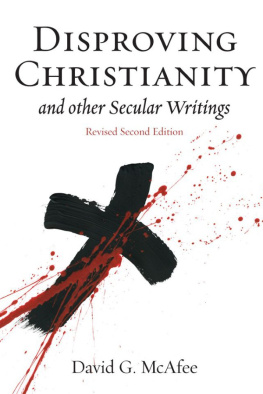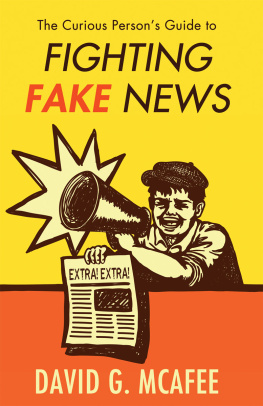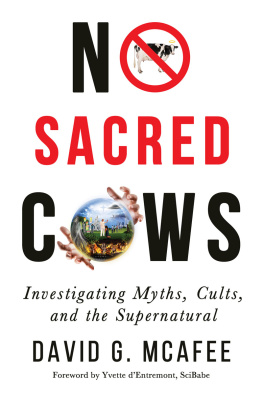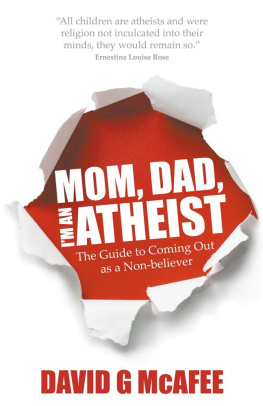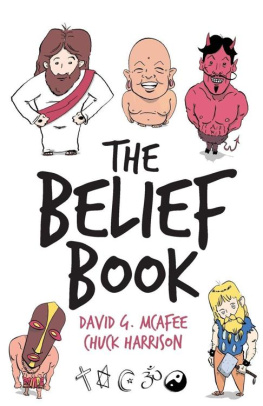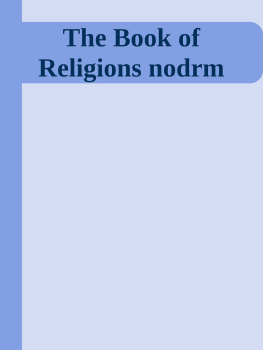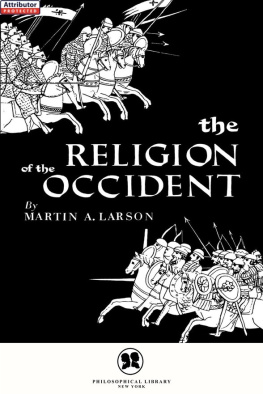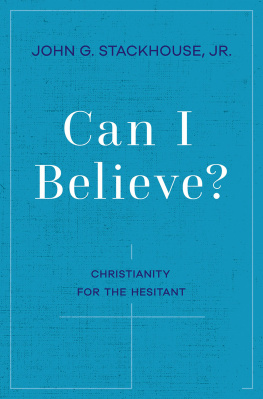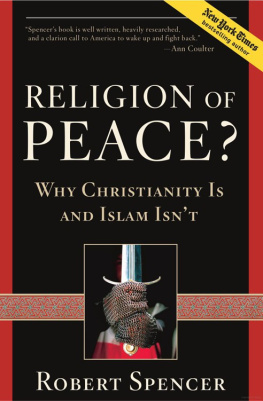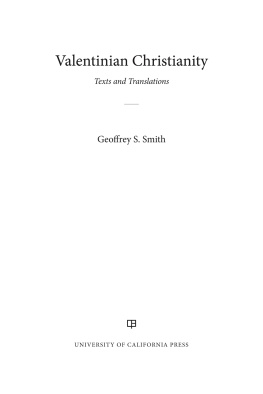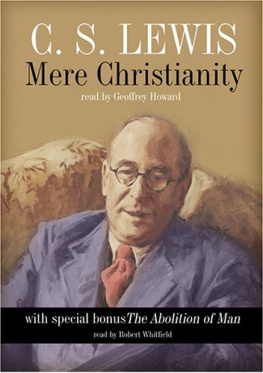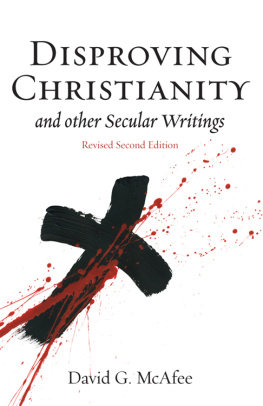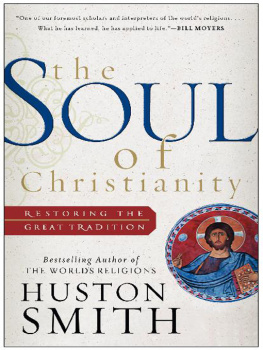DISPROVING
CHRISTIANITY
Revised Second Edition
DISPROVING
CHRISTIANITY
and other Secular Writings
Revised Second Edition
David G. McAfee
First Published in the USA 2010 by David G. McAfee as
Disproving Christianity: Refuting the Worlds Most Followed Religion
This fully revised and expanded second edition published in Great Britain 2011 by Dangerous Little Books
Copyright David G. McAfee
Author photograph by Sharona Belles
All rights reserved. No part of this publication may be reproduced, stored in or introduced into a retrieval system, or transmitted, in any form, or by any means (electronic, mechanical, photocopying, recording or otherwise) without the prior written permission of the publisher.
This book is sold subject to the condition that it shall not, by way of trade or otherwise, be lent, resold, hired out, or otherwise circulated without the publishers prior consent in any form of binding or cover other than that in which it is published and without a similar condition including this condition being imposed on the subsequent purchaser.
This is the revised second edition of a book published in July 2010 entitled Disproving Christianity: Refuting the Worlds Most Followed Religion. This edition features a comprehensive revision of prior material and the addition of new essays and arguments which I have comprised since the first books publication. In addition to new material condemning and disproving fundamentalist Christianity and biblical literalism, I will also provide other secular writings that focus on critiques of religiosity as a whole and consist of various essays on a number of topics. This second edition will fully encapsulate the ideas and arguments present in the first publication, while adding new and relevant material to the discourse.
THE PAGES THAT FOLLOW WILL be focused on the fallacies, improbabilities, and contradictions created by the Christian traditionnot the idea of a God as a whole. Because no one can be completely certain that there is no higher power or some other, more abstract, Creator, it is nearly impossible to disprove; however, it is entirely possible through analysis and research to find discrepancies within the ancient, organized, religious traditions that support the idea of a specific god. Each argument and contradiction presented will bring us closer to disproving the main pillars of Christianity using nothing more than logical thinking, statistics, scientific and historical data, and Holy Scriptures. The debates between Christians and non-Christians have raged for thousands of years, and I expect the conflict to continue; but I do hope that these arguments will allow those Christians who may not have questioned biblical fallibility in the past to realize that these texts are man-made, and they represent the ideas of those fallible individuals who created and edited the compilation of texts now considered to be The Holy Bible. They contain errors, contradictions, and a stagnant moral code which, in many ways, no longer coincides with the morality of modern man. What I hope to gain from presenting these arguments and little-known biblical passages to the reader is a sense of understanding of scripture which may not be presented in Bible Study or in churchand for good reason. If read with an open mind, I truly believe that this book will open peoples eyes to the wonders of free thought in a way that other works utilizing a more philosophical approach, cannot. We begin with Christianity primarily because it is the worlds most popular religion; adherents of Christian sects compose nearly one-third of the worlds population. Although the arguments will not be centered on the dismissal of a God, ideas and theories contradicting a superior Creator (as defined within Christian texts) will also be presented, as they are primary tenets of the Christian religion. Under normal circumstances, disproval of a theory or statement is a relatively simple task; if you find one fault or weakness in the argument upon which the theory rests, it is no longer a valid argument. In this case, however, we will be drawing attention to numerous weaknesses and contradictionsprimarily because of the strength that a religion can have in ones own mind. The Christian tradition, developed thousands of years ago, has been refined and altered by kings and clergymen alike to fit more appropriately in their time period and culture. With new-age and modern biblical interpretations and translations, this continues even todayit is therefore understandable that, in order to create an appropriate response, all weaknesses of The Bible must be carefully noted, including scriptural evidence from the New and Old Testaments, as well as teachings of modern Christianity.
With so many books of The Bible and numerous known and unknown authors, The Holy Bibles words create a battlefield within themselves in which contradictory statements are made, translations are forced, and major and minor edits of each account are made to suit the needs of one generation or the next. It is relatively impossible to consider that it would be flawless in any editionbut that does not stop some fundamentalist Christians from claiming biblical infallibility. In addition to this critique on biblical literalism, I will also show evidence that the very concepts of Christianity, acts of God, pillars of belief, and contemporary teachings are contradictory in themselves, in addition to the unnecessary violence, absurd statements, and ideas that we find ridiculous today that are so common in New Testament and Hebrew scriptures. Each of these ideas will be brought to light using biblical evidence; though every argument and contradiction will not make it into this book, there will be enough to inform the average person who is unaware of the true teachings of the sacred Bible. The evidence for doctrinal contradictions will include passages from The Bible as a whole (as opposed to solely analyzing the New Testament) because the Hebrew scriptures (what Christians refer to as the Old Testament) are no less important and influential to modern Christianity than the New Testament containing the acts of Jesus Christ, as his own words indicate in Matthew 5:17: Think not that I come to destroy the law, or the prophets: I am not come to destroy, but to fulfill. The canonical books of the Torah and other Hebrew scriptures compose the first (and the majority) part of the Christian Bible todayin all versionsensuring that its laws and commandments are taken as divine law to all Christian followers.
Before disproving (or even debating) a theory or ideain this case, we will be discussing a religious traditionone must first accomplish a few tasks. The first of these is to define that which is to be disproven or discussed; as Socrates once said, The beginning of wisdom is a definition of terms.; therefore it will be cited in the chapters that follow as the Word of God. There will be various citations and references for Bible verses on many of the arguments; feel free to follow along.
Once all definitions have been established, only then is it safe to present evidence; as far as Christianity is concerned, through The Bible and religious discourse, the evidence for proof of these supernatural claimsor the Christian thesishas already been submitted. These claims, as I intend to show, fail to meet the burden of proof, which is why faith is considered an acceptable substitute for logic and reason in the Christian tradition. However, this reliance on that which cannot be proven will not stop us from examining the claims of the Christian Bible, as well as the teachings of Christian churches of various denominations, in a logical manner in order to create a successful counterargument. Keep in mind that it is much easier to

